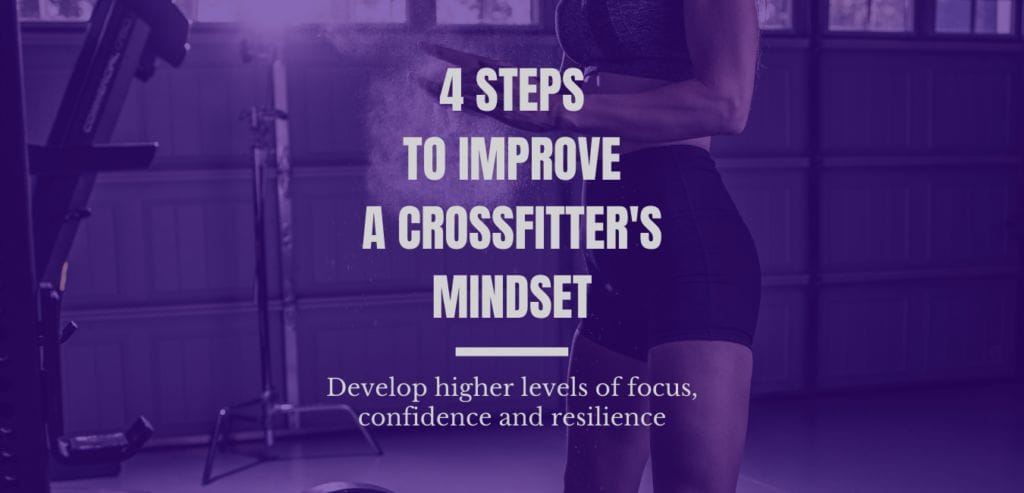As a CrossFit athlete, you put in tons of hours and attention into your training, your form and technique, and even your nutrition. Focusing on those aspects undoubtedly help you see positive progress. But one “muscle” that often gets overlooked is your brain!
What if you could channel feelings of anxiety, doubt and frustration into higher levels of confidence, focus and resiliency?
Changing your mindset will help you be successful beyond the gym and training sessions too. But, just like your physical improvements, it requires an amount of intentional training and practice!
Regardless of your age, athletic ability, experience with CrossFit or any other sport, here are 4 key steps to improving your mindset to become unstoppable!
1) Embrace Your Failures
This one sounds cliche, but how often do you actually put this practice into action? Decide that any failure, big or small, will be an opportunity for you to learn something.
Take the time to reflect on the failure and pinpoint what you can learn from it. These failures don’t need to be massive…it could be missing your goal time on a workout in the gym or an idea at work that flopped when you expected it to flourish. What can you do to be better next time around?
Staying humble and accepting failures takes practice, and the only way to practice this is by failing. Welcome challenges that might cause you to fail, otherwise you will never get the opportunities to learn.
 2) Narrow Your Focus
2) Narrow Your Focus
A wide focus looks like this, mid-workout for example: “I think I’m getting tired, I feel my legs fatiguing. Look at that person over there, they haven’t stopped yet! Oh my gosh there’s 10 more minutes. My breathing is so fast I need to stop. I can’t believe my co-worker forgot to do their job today. I’m not in good shape, this is too hard…”
A narrow focus looks like this, mid-workout for example again: “Breathe. Okay I know I can do 10’s here, I just have to focus. Getting a little sloppy, no wonder this feels hard, let me fix my form…okay much better, I can breathe and keep moving here. I can do this”.
Focusing on too much at once, and more importantly, focusing on things outside of your control is a pathway to destruction. Instead, focus on what you can control. Narrow your focus like a laser beam on exactly what you need to do, for yourself, to be successful. It’s no use focusing on someone else (in the gym or out of it!) because their performance has zero impact on your abilities, successes or failures. That is all up to you.
3) Expectations vs Commitment Reset
When you find yourself falling below your expectations, it’s time to readdress what those expectations are compared to where your commitment level is. Taking the time to sit and think on this will help you become much happier and much more successful in the long run!
Your expectations of performance and progress need to be set accordingly to the level of commitment you can, and are willing, to give. If the expectation is to become a CrossFit Games Athlete, but you only have time and energy to attend class 3 days a week, it’s unlikely you’ll get to that goal…and that feels frustrating! Rehashing what you’re expecting and basing it on the level of commitment you can give will help to find a goal that can actually be accomplished. And when you feel more successful along the way and that goal is more within reach, you are much more likely to get there!
So while you may not be able to accomplish the CrossFit Games goal, you can reset your expectation to compete at a local-level competition which requires the level of commitment you are willing to give.
Inversely, sometimes you need to reset and adjust your commitment level to meet the set expectation that you don’t want to compromise on. If you are set on competing at a local-level competition but your actions and commitment level have faltered and you’ve skipped a handful of workouts lately, it’s time to reset your commitment level and prioritize the things that will allow you to get your training in, fuel your body right and recover properly again so you can reach those expectations.
4) Work Smarter – Not Harder
More isn’t always better and harder isn’t always better. Be smart with how you approach your goals, be smart with how you address your failures and learn from them. Be smart with where you focus your intention and be smart with your expectations and commitment levels. Reaching your goals doesn’t need to feel HARD 24/7.
Your fitness goals and nutrition goals don’t need to feel restrictive, exhausting and overwhelming. Work smarter by hiring coaches to guide you. Find the habits that fit into your lifestyle and help you feel good.
Stay smart by trusting your process and trusting in the work and effort you’re putting in. Don’t get distracted by other people or other methods that brag a quick-fix that will feel so hard that it must be working. It doesn’t need to feel harder to work better. You just need to stay smart and trust yourself!



 2) Narrow Your Focus
2) Narrow Your Focus
